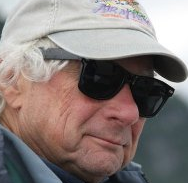Hillary: The Most Battle Seasoned White House Candidate Since Ulysses S. Grant
By Joe Rothstein
Editor, EINNews.com
My first presidential campaign experience was as a member of the creative media staff for Senator Ed Muskie of Maine. For those younger than me (and that now includes just about everyone) Ed Muskie was the clear favorite to win the 1972 Democratic Party presidential nomination. “Everyone” said so.
For the year prior to the first primary in New Hampshire Muskie led the polls by maybe 30, 40 or 50 points. It didn’t matter. No one else really was in second place. He even led President Nixon in general election match-ups.
Muskie had been Maine’s governor, the vice presidential candidate in 1968, had all of the campaign money any campaign would ever need and an all-star staff. Most of my fellow top staffers went on to stellar careers in law, politics, media and other pursuits. If you recognize names like George Mitchell, Mark Shields, Tony Podesta, Harold Ickes, and Ann Wexler you get a flavor for the political savvy and talent driving the Muskie campaign.
I joined that campaign in January, 1972, at a time when January of the election year was about when presidential campaigns began getting serious coverage. The primaries were somewhat of a nuisance diverting our time and money until we could get to the main event against Nixon.
In March, Muskie won the New Hampshire primary as expected. But by fewer than 10 points over Senator George McGovern. This was considered by all concerned---media, contributors and other insiders who mattered---as a terrible defeat for Muskie. He had won the primary but failed all prior expectations. By April the Muskie campaign was over and McGovern went on to become the nominee.
There’s no space here to dissect all of the factors that brought down Ed Muskie. Some were his own weakness as a candidate on the big stage. Some were the result of what were then called “dirty tricks” played by the Nixon campaign. And no small measure of the blame can be fixed on the interplay of all of the type A figures making the campaign decisions.
The road to Democratic presidential nominations is littered with similar political wreckage. Jimmy Carter pulled off a McGovern-like upset in 1976. Ted Kennedy, rich with money, talent and great poll numbers, lost a bid to unseat Carter in 1980. Walter Mondale barely survived an unexpected challenge from Gary Hart in 1984. And so on, right up until 2008 when a rookie U.S. Senator pulled the red carpet from under the Hillary Clinton coronation.
Which brings me to Hillary Clinton, 2016. Will she be the Hillary of 2008 or the Muskie of 1972 or all of the fallen favorites in between?
I don’t think so. Can’t be sure. No one can. The campaign has barely begun. But this year the stars look aligned properly for her.
To succeed, she needs to be a better candidate than she was in 2008. She needs to survive all of the damage an all-star, type A campaign bureaucracy will cause. She needs to keep the media at a safe distance without setting them on a mission to destroy her. And her campaign will have to creatively counter the 21st century version of “dirty tricks” her opponents will throw at her.
Having your face on everyone’s target board is not something most politicians can handle, either personally or administratively. But don’t sell her short. Clinton may be on a mission to show her “soft” side this time, but at her core, Clinton is more battle-hardened than anyone who has sought the White House since Ulysses S. Grant.
And a big part of that core is having a fine-tuned political calculator as a compass. Stop anywhere you choose on the decades-long Clinton political time line and you will find political true north. Bill Clinton was not elected governor multiple times, as a Democrat in Arkansas, without being in tune with Arkansas voters. He and Hillary adjusted quickly and successfully to 1992 accusations that would have felled the less adaptable. Bill Clinton won reelection in 1996, despite a Republican surge, through “triangulating” on then-popular issues like welfare and tough-on-crime fever.
Hillary will handle Bernie Sanders by narrowing ideological space between the two of them (and O'Malley and others) on key progressive issues. In fact, judging by her past, that’s where she’s most comfortable—--as a political progressive. She will channel Sanders without the scary “socialist” logo and present herself as an electable Sanders.
In 2008 she defeated Barack Obama in key primaries but lost the nomination in organizationally intense caucus states. It was a strategic and administrative failure. Neither she nor the experienced Clinton organization will make that mistake again.
As for the general election...
Jeb Bush is showing signs that he will self-destruct relatively early in the nominating process. If he doesn’t and survives to become the Republican nominee, the dynasty questions, and other “back to the future” baggage goes away for her. If Bush isn’t the November opponent her most dangerous opposite would be Ohio Governor John Kasich, the popular, seemingly more moderate governor of a must-win state. Kasich, though, will struggle mightily to break through the GOP’s ideological primary wall.
Having been neck deep in political campaigns for decades I know enough not to bet on outcomes. Candidates are people, and therefore not easily objects of quality control. Particularly in the white hot heat of presidential politics. But if anyone can hold it together, Hillary can.
There’s much more to be said about this, but we’re nearly seven months distant from when anyone casts a vote. If I’m wrong, I’ll have plenty of time to find excuses. And, like Hillary. I'm adaptable.
(Joe Rothstein can be contacted at joe@einnews.com)




